If you’re a bike geek, the November elections were like that Christmas when you got your very first new bike and you were brimming with excitement at the potential of good times that were sure to come. With so much bike-friendly mojo in Congress, it’s hard to not think bikes are headed for some serious political gains in the next few years.
One man who will play a major part in this is Eugene Congressman Peter DeFazio. I first met DeFazio at the National Bike Summit last year and then bumped into him again at the Oregon Bicycle Tourism Summit back in May.
Trust me, DeFazio is the real deal. He even rode and camped with us at Cycle Oregon (here he his on stage after Day 2 in Starkey)!
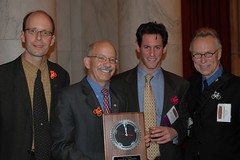
In light of the upcoming National Bike Summit (March 14-16) in Washington D.C. I’ll be covering politics and politicians much more and to kick things off I thought I share some bits from an article I just came across in DeFazio’s hometown paper, The Register Guard (registration req’d, go here for login).
The article discusses how DeFazio might use his newfound power (he has been named head of a transportation subcommitee) to benefit bikes. Adding even more bike fire-power to the 110th Congress are perennial pedal-powered progressives Jim Oberstar (D-MN) and Portland’s own Earl Blumenauer (more on them later).
According to the Register Guard, DeFazio has already put some plans on the table:
“He plans to hold hearings on the recently passed Safe Routes for Schools bill to ensure that states properly direct federal dollars into roadway improvements so that children can pedal or walk to school without encountering traffic dangers.
DeFazio also wants to explore ways to improve rural highway safety for cyclists. He said recent cyclist deaths in his district have keened his interest in such improvements.
One idea…requires that when a rural route is resurfaced or rebuilt, its shoulders are widened and a rumble strip installed to warn motorists when their vehicles veer outside their lane.”
It’s still very early in the game, but even so,
“DeFazio said it was too early to start promising fixes for specific cycling hot spots in his district. But he said the change in leadership and in the way cycling is regarded in Congress makes the chance better than ever that such help could eventually be on its way.”
I can’t wait for March. All signs point to a very important and inspiring National Bike Summit. Will you be joining us?


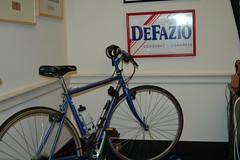
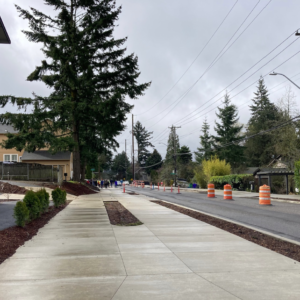
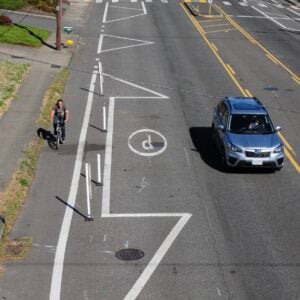
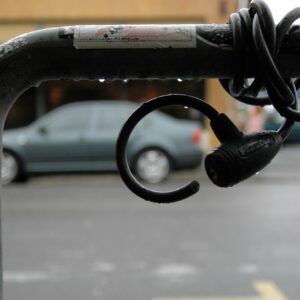
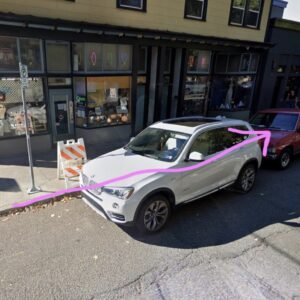
Thanks for reading.
BikePortland has served this community with independent community journalism since 2005. We rely on subscriptions from readers like you to survive. Your financial support is vital in keeping this valuable resource alive and well.
Please subscribe today to strengthen and expand our work.
This is the start, at the federal level, of the Bicycle Revolution!
Definitely good news.
Lets encourage DeFazio, Blumenauer, et al to resurrect the Bicycle Commuter Act (HR 1052 last session).
Currently, employers may offer a Transportation Fringe Benefit to their employees for commuting to work…parking, transit, carpooling, etc ($100-190/mo). The Bike Commuter Act (H.R. 1052), introduced by Congressman Blumenauer and cosponsored by Representative Mark Foley (R-FL), aims to include bicycling in the Transportation Fringe Benefit.
As a cyclist who puts in thousands of miles on rural roads every year, I must say I’m alarmed DeFazio’s rumble strip idea. In the case of shoulders that are 4′ wide or wider this would be fine. But for shoulders any narrower, a rumble strip is a serious obstacle for a cyclist. As jarring as they are for automobilists, rumble strips are ten times worse for cyclists — they can just about throw you off your bike. The presence of a rumbles strip can seriously restrict a cyclist’s options for avoiding road debris, or otherwise impede the cyclist when he has a legitimate need to use part of the road proper.
This is great!
So many people look at bike-friendly cities in Europe and assume that they’ve always been that way…and that American cities could never achieve such street-related civility. In fact, those cities all favored cars until the political forces made a conscious decision to change their course and create bike- and ped-friendly infrastructure. (anyone who wants to argue that the old-world narrow streets are, by their nature, bike- and ped-friendly should know that those streets come with narrow sidewalks and bumpy cobblestone paving…unregulated parked and moving cars squeeze bikes and peds out of the streetscape)
It takes political will to change the funding structure for transportation projects. Build systems that are safe enough for young children to use, and cyclists and pedestrians of all ages WILL come and enjoy a new freedom.
Hooray!
I am under the impression that the recent tragedy in Eugene was caused by the truck driver, but actually by a pace line accident. A rider a couple of people up slipped on a “fog” strip”, causing a chain reaction crash killing one person under a truck.
If there had been a rumble strip there, we would probably have lost a couple more from the same pace line.
I do not belive that rumble strips are a good thing at all to have on a heavily cycled road.
Full road tires do not react well to such strips.
Mt, tires react even worse…
I just read Mr. Wolfes post above, and now realize I am just echoing his sentiment. For that I apologize.
I also do not see why we need to fight to have “Safe Routes” to schools?
This should be a given, even a requirement. What the hell kind of country do we live in that we have to fight with legislation to protect our children?
There should be no question!
When I am riding through a school zone, or just near a school in session, I move to the middle of the lane, if not nearer to the center line.
This is to slow down or stop the constant flow of cars past me, when I know I am doing the “School Zone” speed limit.
People do not like this one bit, but I am just doing my part.
Besides the safe routes legislation, I have not seen or heard of one bit of cycling legislation work that appears to be ( as seen from the perspective of a street level, professional cyclist) worth a damn.
( I admit, I have not heard about the fixed gear legislation ideas yet..)
Oh, a couple such as below work, but only for the smallest percentage of cyclists. (And the corporate world only at that with some) These, and the bills presented by the BTA, do not seem worthy of our time, or tax dollars.
Bicycle legislation should include things that will help every body, not just target voters…..
“Currently, employers may offer a Transportation Fringe Benefit to their employees for commuting to work…parking, transit, carpooling, etc ($100-190/mo). The Bike Commuter Act (H.R. 1052), introduced by Congressman Blumenauer and cosponsored by Representative Mark Foley (R-FL), aims to include bicycling in the Transportation Fringe Benefit.”
Also, I believe that this is a waste of money and legislation.
It affects so few of the thousands of cyclists we have here.
Unless you work for a select few corporations, these benefits will not ever be offered to you.
Perhaps a more reasonable, city based commutter program?
Where anyone who works anywhere could enjoy the needed benefit, regardless of what company you work for?
Possibly on a sliding scale, so as to be accesible to even the poorest of commuters?
Or, dammit, we pay enough in taxes already, how about free?
Just cancel a couple of blocks of trolley track to pay for it ( 7 million dollars is a cost I think I read for the Bond Street project (4 blocks).
Shouldn’t the effort of “Green” Commutting every day be worth something?
I hope Earl reads this.
I do like his ties…
I’ve been wondering whether they plan to reintroduce the Bicycle Commuter Act. I fully support that!
It’s really easy to only look at what we don’t like sometimes. Seems that’s what Michael Wolfe is doing here with his concern about putting rumble strips on non-existent shoulders.
Looks like he overlooked the first part of DeFazio’s idea … “when a rural route is resurfaced or rebuilt, its shoulders are widened”. I personally hope that they go for something more meaningful than widening to 4 feet. Provide at least 8 so we can use the roads for transportation.
Sure, the Transportation Fringe Benefit only benefits a small portion of the cyclists out there, but it’s a step in the right direction.
I am offended that my company subsidizes my co-workers who drive to work (through this benefit). They also offer subsidized TriMet passes, which is great, but they offer nothing to cyclists to offset the costs of bicycling to work. Expanding the Transportation Fringe Benefit to include bicycling would bring parity to those offices where such a benefit is already being given to car drivers and transit riders.
Yes, such benefits should go even further: Metro and the City of Portland have great bicycle-commuter benefits that should be copied by all employers. One step at a time…
Comprehensive city/county/state/national commuter programs would be welcome. However, the Bicycle Commuter Act is sensible in that it:
– does benefit everyone through less congestion, lower emmissions, etc.
– is simply an act of equality for non-automobile commuting
– will incentivize an increasing population of beneficiaries
– does not discrimitate among eligible corportations/businesses/employers (any could reduce tax liability)
I’m so excited about this. The federal government is always making my life so much better.
Okay now I’ll be serious.
Here is an idea for a ‘Bike Commuter Act’, raise gas taxes such that the taxes would fully cover the US military budget. Me thinks that would get some people on bicycles.
Here is another idea, 10% of EVERY transportation dollar spent goes to bike/ped improvements.
US culture needs simplification and accountability. Throwing a bunch of little bones will not fix the problems. It will just complicate the bureaucracy and cost us all more tax money.
Efforts like ‘The Bike Commuter Act’ and ideas like wider road shoulders will have no meaningful effect on the ridiculous car culture we have, so don’t waste govt money and time. Do something meaningful. It’s time to get off foreign oil. It’s time to improve the quality of life in the country. We need some politicians who will lead us forward.
Slick-
My concerns are not manufactured, nor do they come from selective reading. I read the complete quotation. The passage does not mention how much widening would be done to accompany a rumble strip. Going from 1 foot shoulders to 2.5 foot shoulders counts as “widening”. But going from a road with a 1 foot shoulder and no rumble strip to a road with a 2.5 foot shoulder and a rumble strip does not strike me as an improvement in the conditions for cyclists.
As soon as ridealot gets the Solve All World Problems Act passed we can repeal all realistic, incremental, positive & meaningful legislation passed in the interim.